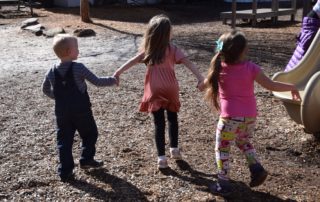Building a Strong Foundation
The best way to learn about the program at Hill is to talk to us and visit. If you would like to learn more we hope you will contact us, either through email or by calling the school to set up an appointment. We are proud of our program and eager to discuss it with you.
Junior Kindergarten
In Junior Kindergarten, a child’s play is his or her work. The program focuses on providing a meaningful, engaging, and joyful learning experience, while meeting the individual developmental needs of each child.
Junior Kindergarten (JK) focuses on each child’s healthy development in a variety of areas. Children learn socialization skills by interacting with each other while supervised and guided by caring and experienced teachers. The program helps children develop physical awareness and grow emotionally, so that they build skills and understandings of their bodies, hearts, and minds. These experiences, we believe, are the best ways to prepare children for later academic work.
A child in the JK program has a variety of experiences every day. Play time is central to children’s overall social, emotional, physical, cognitive, and language development during the JK year. Children learn through active engagement in sensory experience and by using manipulative learning materials. Opportunities to engage with peers in play and promote such growth occur through block building, dramatic play, playground time, toys, and games. Art and cooking projects also enhance development through exploration and experimentation.
Each week students take classes outside of the homeroom, taking advantage of Hill School’s facilities and teachers to go to sports, library, and music. In all classes, each child’s creativity and ideas are nurtured. The art teacher comes into the JK classroom several times per year for special projects. Our ultimate goal is to build a solid foundation for each child, by creating a strong sense of community and security where self-confidence, independence, and growth of individual strengths are encouraged.
Junior Kindergarten students are each paired with a 6th grade mentor who they see at least every other week. These mentor and mentee pairs do a variety of activities together including working on Calliope and Curves, Angles & Dots submissions.
The JK program provides the foundation for literacy learning. Children are exposed to a print-rich environment that allows them to practice literacy skills in real-life experiences, and are taught explicit concepts to help further their development. Language and vocabulary is developed throughout the day by speaking and listening as we share memories, stories, books, songs, and rhymes. Throughout the year, a child in the program will demonstrate knowledge of the alphabet (letters and sounds), understand concepts of print, comprehend various texts, use emerging reading skills, write letters and words, and understand the purpose of writing. Most importantly, a love for reading and writing will be encouraged within each child as they are provided opportunities to use their growing abilities.
Big Math for Little Kids is a comprehensive and enjoyable mathematics program that builds upon what young children already know and are capable of doing mathematically. It is based on research and field-testing in early childhood classrooms, so the materials and concepts are developmentally appropriate for preschool. The program is divided into six Units: What Are Numbers?, The Shape of Things, Patterns Plus, Measure Up!, Working With Numbers, and Getting Around (positional language). These units integrate mathematics learning into other academic areas such as music, movement, reading, writing, art, and classroom routines, like lining up.
In Junior Kindergarten, some integrated science is taught by homeroom teachers, and other science topics are taught by a science teacher beginning in January, when students have become comfortable with the routine of a school day. Science topics are introduced through field trips and classroom-based activities. The goal is to take advantage of children’s natural curiosity about their immediate environment and to introduce methods for investigating that environment. Topics covered are characteristics of leaves, difference between evergreens, identification of winter birds, how snow crystals form, types of animal tracks and changes in seasons.
Unit themes encompass all aspects of learning, especially social studies and science. These themes are woven into the program throughout the year. Themes include: All About Me; Apples and Pumpkins of Fall; The Five Senses; Holidays; Winter Animals; Fairy Tales; Culture Study; Weather; and Ocean Life. Topics are adjusted appropriately to suit the interests of the group.
When learning about winter animals for the December unit theme, Junior Kindergartners donate money and supplies to the Blue Ridge Wildlife Center for a community service project. The students present their donations to the organization when they come to visit for an in-house field trip.
The Handwriting Without Tears program incorporates child-friendly teaching strategies, such as using music and movement to bring lessons to life, and multi-sensory manipulatives to build fine and gross motor skills. Handwriting lessons teach body awareness, listening, crayon grip, drawing, building, letter and number recognition, and capital letter and number formation. Physical development and social/behavioral skills are particularly important in JK. In fact, children need to develop both fine and gross motor skills to be able to write. All these skills are critical to good emotional and social development and future academic performance.
JK children also enjoy a variety of field trips and special events, including nature hikes each season and trips to an apple orchard and pumpkin patch. When appropriate, JK children also participate in Hill School events such as the Halloween Parade, the celebration of 100 days of school, Culture Study, and Grandparents and Special Friends Day. In the spring, JK children rehearse and perform their own Reader’s Theater play.





